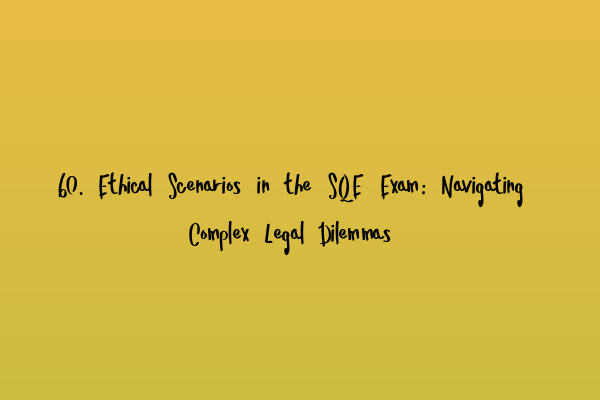60 Ethical Scenarios in the SQE Exam: Navigating Complex Legal Dilemmas
Welcome to SQE Exam Law, where we provide comprehensive support and guidance to aspiring solicitors preparing for the Solicitors Qualifying Exam (SQE). In this blog post, we will explore 60 ethical scenarios that may arise in the SQE exam and provide insights into effectively navigating these complex legal dilemmas.
Introduction
The SQE exam is designed to test your knowledge, skills, and judgment as a future solicitor. Ethical scenarios are a crucial aspect of the exam as they assess your ability to identify and resolve ethical dilemmas that may arise in legal practice. These scenarios challenge your ethical judgement, critical thinking, and legal knowledge.
It is essential to familiarize yourself with the SRA Code of Conduct, the underlying principles of professional ethics, and legal obligations that guide solicitors’ behavior. Understanding the ethical landscape will enable you to approach the scenarios confidently and provide well-reasoned responses.
Scenarios
1. Conflict of Interest: You represent two clients with conflicting interests in a real estate transaction. How would you handle this situation? SQE 1 Preparation Courses
….
60. Client Confidentiality: Your client presents a document containing confidential information that could be detrimental to another party. How would you balance your duty of confidentiality with your obligation to disclose relevant documents? SRA SQE Exam Dates
Navigating Ethical Scenarios
Navigating ethical scenarios requires a systematic approach that ensures you address the ethical dimensions while adhering to legal principles. The following steps will help you prepare for these scenarios:
- 1. Identify the ethical issue: Carefully read and analyze the scenario to identify the primary ethical issue at stake.
- 2. Review applicable laws and regulations: Assess the legal framework and obligations that govern the relevant area of law.
- 3. Consider relevant professional rules: Consult the SRA Code of Conduct and other professional regulations to determine specific ethical responsibilities.
- 4. Analyze the options: Evaluate the available options and their potential consequences from an ethical standpoint.
- 5. Utilize ethical decision-making models: Apply ethical decision-making models, such as consequentialism, deontology, or virtue ethics, to assess the ethical implications of each option.
- 6. Justify your decision: Clearly articulate the rationale behind your chosen course of action, considering the legal and ethical considerations.
- 7. Reflect and critique: Assess the strengths and weaknesses of your decision, considering alternative perspectives and potential ethical challenges.
Conclusion
Mastering ethical scenarios is essential for success in the SQE exam and in your future legal career. By familiarizing yourself with the SRA Code of Conduct, understanding key ethical principles, and applying structured decision-making approaches, you can confidently navigate complex legal dilemmas.
For more practice and preparation resources for the SQE exam, check out our recommended articles:
- SQE 1 Practice Exam Questions
- SQE 1 Practice Mocks FLK1 FLK2
- SQE 2 Preparation Courses
- SQE 1 Preparation Courses
- SRA SQE Exam Dates
At SQE Exam Law, we are here to support you in every step of your SQE exam preparation journey. Good luck!
